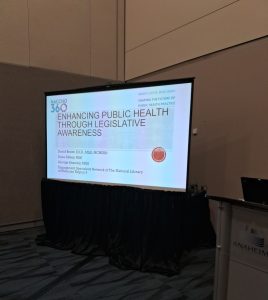R4 Engagement Specialist Attends National Association of City and County Health Officials (NACCHO 360) Conference
Posted by liaison on July 28th, 2025
Posted in: #Health Sciences List
 David Brown, one of the Engagement Specialists within NNLM Region 4, attended the NACCHO 360 conference in Anaheim, California from July 15-18. The theme of this year’s conference was “Bright Lights, Bold Ideas: Shaping the Future of Public Health Practice.”
David Brown, one of the Engagement Specialists within NNLM Region 4, attended the NACCHO 360 conference in Anaheim, California from July 15-18. The theme of this year’s conference was “Bright Lights, Bold Ideas: Shaping the Future of Public Health Practice.”
Conference Overview
The conference drew over 2,300 attendees, including more than 200 from NNLM Region 4, representing individuals working in or concerned with public health. The event featured over 100 vendors and more than 150 posters and presentations.
Conference Presentation
 During the conference, David presented on “Enhancing Public Health Through Legislative Awareness,” a presentation co-authored with two fellow Region 4 engagement specialists, Dana Abbey and George Strawley. The presentation described, demonstrated, and provided participants with opportunities to engage with some of the 50 policy databases provided by the National Conference of State Legislators.
During the conference, David presented on “Enhancing Public Health Through Legislative Awareness,” a presentation co-authored with two fellow Region 4 engagement specialists, Dana Abbey and George Strawley. The presentation described, demonstrated, and provided participants with opportunities to engage with some of the 50 policy databases provided by the National Conference of State Legislators.
Key Themes from Plenary Sessions
- Public Health Challenges and Mission – Plenary speakers emphasized the ongoing challenges facing public health professionals and organizations. A central theme was the continued need to advocate for and protect the most vulnerable and underserved populations in public health. One speaker highlighted that “the mission of public health is to fight for health equity.”
- Identity Crisis in Public Health – Several speakers noted that public health is experiencing an identity crisis. While the field celebrates new technologies, it has drifted away from fundamental prevention activities. The pandemic revealed a critical failure in public health: the lack of trust and partnerships between individuals, public health officials, and medical care providers.
- Training and Professional Development – A key theme emphasized the need for better training opportunities for public health professionals. Speakers advocated for engaging, practice-based training approaches rather than traditional educational methods such as lectures and knowledge-check assessments.
- Partnerships and Collaboration – The importance of partnerships and collaborations to champion projects within the health and human services sectors was repeatedly emphasized throughout the sessions.
- Mental Health as a Public Health Priority – The final major theme focused on mental health as a critical public health issue. Speakers stressed that behavioral health must become a major concern for public health moving forward. The crisis in behavioral health is significant, with fewer than 20% of psychiatrists accepting new patients and 35% not accepting insurance nationwide. Wait times to see a psychiatrist average two months in urban centers and four months in rural and frontier areas.
Concurrent Session Highlights
- Data Visualization – Sessions on data visualization for public health revealed the abundance of available data and numerous display options. For example, there are at least 67 different ways to visualize income data. One notable resource presented was the Idaho Region Community Health Atlas, which contains numerous indicators and maps that can be used by the public to determine optimal deployment of programs and services. More information is available on Idaho Oregon Community Health Atlas site.
- Age-Friendly Health Systems – The aging session emphasized making health systems age-friendly using evidence-based approaches. The presentation featured the 4M’s framework from the Institute for Healthcare Improvement, which emphasizes: What Matters. Medication, Mentation, and Mobility. Check out the Guide to Using the 4Ms in the Care of Older Adults in Hospitals and Ambulatory Care Practices for full details. Agencies utilizing the 4M’s framework are believed to provide aging individuals with more friendly health systems. Additional discussion on aging highlighted the importance of attitude, noting that maintaining a positive attitude about aging extends life expectancy by 7.5 years and may help prevent the onset of Alzheimer’s Disease.
- Community Health Workers – Several sessions focused on the expanding use of community health workers in the public health sphere, highlighting their growing importance in community-based health initiatives.
Conclusion
The NACCHO 360 conference provided NNLM Region 4 with valuable opportunities to network and engage with public health professionals from across the country and region. Given the significant challenges facing all public services at this time, conferences like this—where information is shared and professional networking occurs—provide crucial opportunities to help ensure the future success of health and human services programs.

 David Brown, one of the Engagement Specialists within NNLM Region 4, attended the NACCHO 360 conference in Anaheim, California from July 15-18. The theme of this year’s conference was “Bright Lights, Bold Ideas: Shaping the Future of Public Health Practice.”
David Brown, one of the Engagement Specialists within NNLM Region 4, attended the NACCHO 360 conference in Anaheim, California from July 15-18. The theme of this year’s conference was “Bright Lights, Bold Ideas: Shaping the Future of Public Health Practice.” During the conference, David presented on “Enhancing Public Health Through Legislative Awareness,” a presentation co-authored with two fellow Region 4 engagement specialists, Dana Abbey and George Strawley. The presentation described, demonstrated, and provided participants with opportunities to engage with some of the 50 policy databases provided by the National Conference of State Legislators.
During the conference, David presented on “Enhancing Public Health Through Legislative Awareness,” a presentation co-authored with two fellow Region 4 engagement specialists, Dana Abbey and George Strawley. The presentation described, demonstrated, and provided participants with opportunities to engage with some of the 50 policy databases provided by the National Conference of State Legislators.